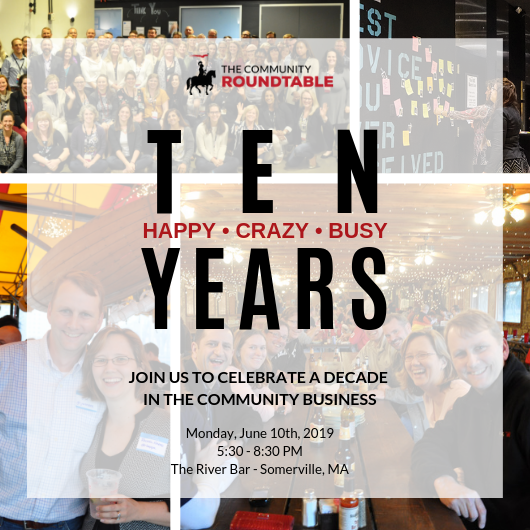
I never intended to be an entrepreneur. Today, we are celebrating our 10th anniversary at The Community Roundtable. It seems improbable.
Why DID I agree to start this crazy adventure with Jim Storer?
At the time, in 2009, social software was exploding. There was a lot of experimentation going on but no one knew what they were doing or where this explosion of engagement would take us, our organizations, and our society. Jim and I looked at the space and realized there was a lot to learn – and a lot to learn from each other. We each had different backgrounds but both included experiences in helping people learn – me on the research, strategy, and executive side and him on the conference management, learning & development, and early online community side. We had a unique and needed set of skills to address the market opportunity – helping organizations effectively seize the potential of social technologies.
Critically, we saw the difference between open social networks and defined communities, with more structure, boundaries, and intentional design. Communities had the potential to drive significant value and deliver on more complex objectives. We knew a lot of the early community professionals doing this work – but there were too few opportunities for them to learn from each other and little consistent research, although individuals like Bill Johnston, Nancy White, Etienne Wenger, Jono Bacon and others had started down this path before us.
While we had the skills and there was a market opportunity, the thing that motivated me personally was something different.
It was the state of work culture and leadership.
While I have been fairly lucky to have great colleagues and peers across my career, the culture of work seemed to demand exceptional loyalty and time but without much in the way of security or flexibility for other demands of life. I had been laid off three times. The jobs I loved the most and thrived in required very long hours and often lots of travel, with leaders that didn’t seem to think there was any problem with that. Having waited to start a family, the prospect of that kind of work life while juggling children did not seem worth it and yet, I love to work on interesting problems.
I refused to accept that to do interesting work that engaged and excited me also required me to work more than 40 hours a week.
I refused to accept that I needed to request time off to take a child to a doctor’s appointment.
I refused to accept the financial health is the only measure of value for organizations.
I refused to accept that I had to squeeze all of my vacation time into two weeks.
Considering work culture more deeply, I also found the manufactured stress, the contentiousness, and the passive-aggressive relationships to be unnecessary. I refused to believe that work had to be stressful. I also refused to believe that relationships with customers had to be transactional and contentious.
I worked at enough places to know that I was unlikely to find the work culture I wanted in the area where I had expertise to offer. The opportunity to build a work culture in which I could thrive, both personally and professionally, motivated me to show the world it could be done.
Ten years on, that vision of a healthy culture has largely become reality. We have so few contentious conversations that I can still count them on two hands. We do engage in many hard conversations required to negotiate differences but those feel markedly different. We practice what we preach.
Maybe because of this our work is increasingly focused on helping clients change and craft their cultures to be more collaborative. Together with our clients and members, we have cracked the code on engagement.
I’m still here because I know work can be engaging, joyful, healthy, AND productive.
Today, we’ll gather our team and then spend some time celebrating the work it’s taken to get us here.
